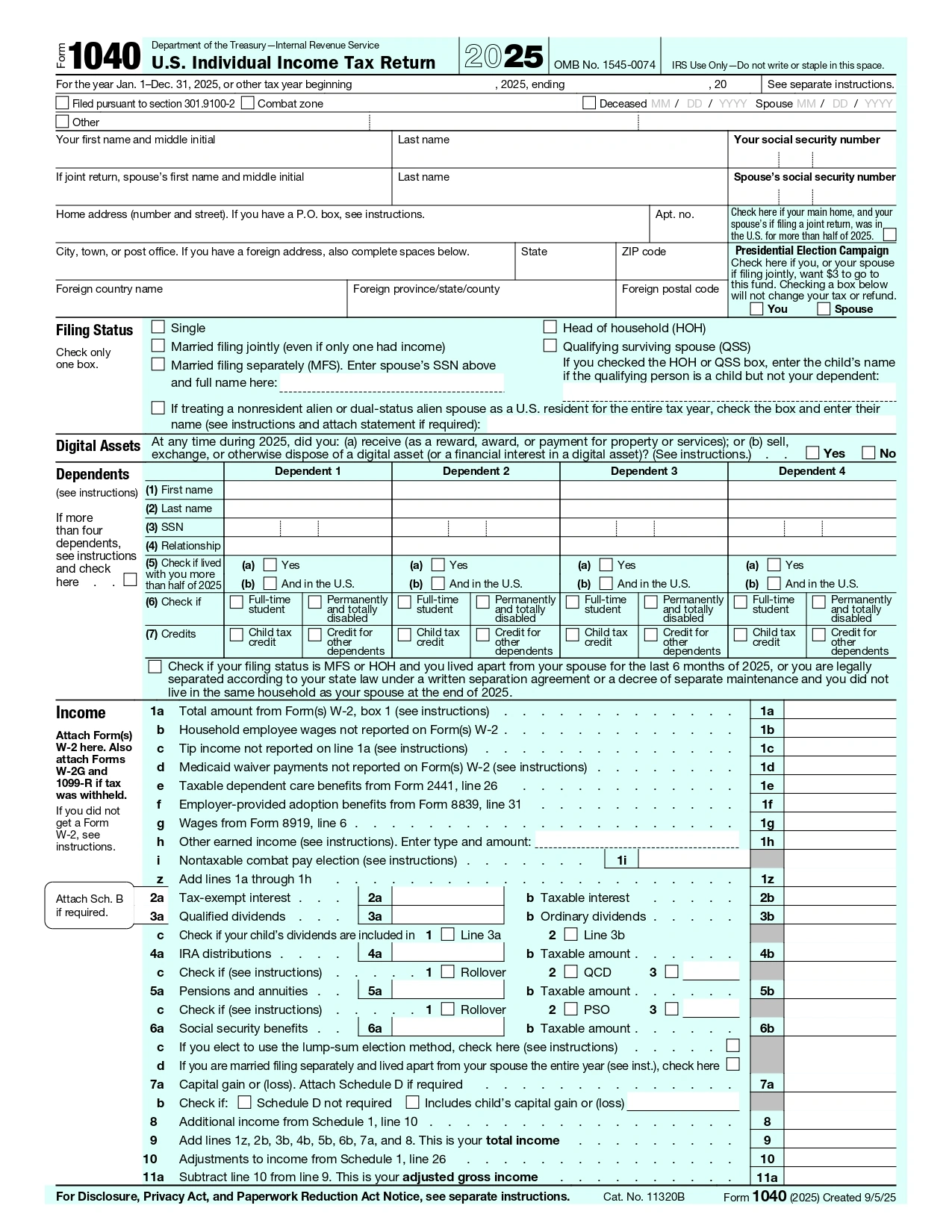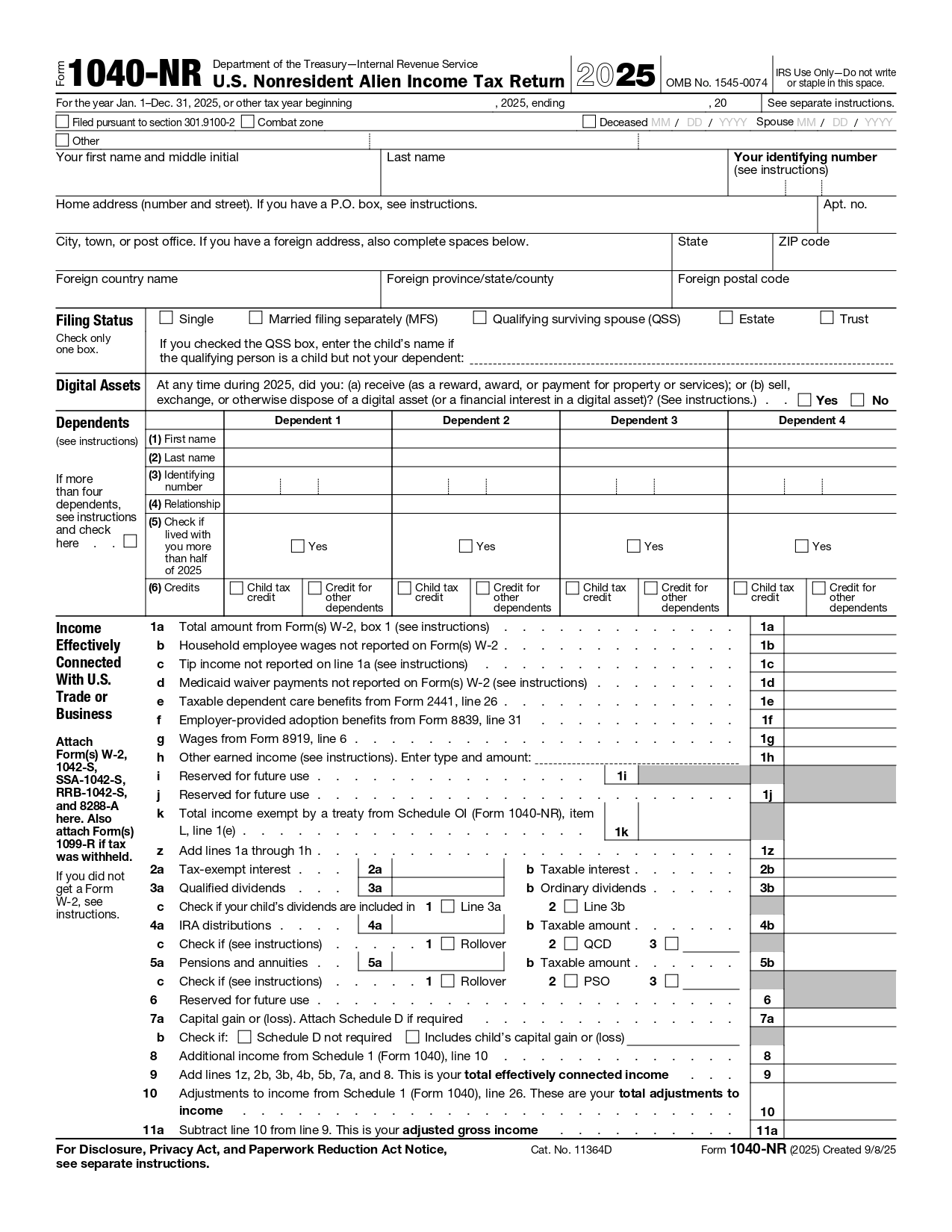US Local CPA Tax Services | Professional Tax Savings | Compliant Tax Refunds | Tax Planning
Individual & Family Tax Filing · Business Tax Filing · Tax Extensions · Coverage in All 50 States & Washington DC· Remote Tax Filing Services

How to Determine Your U.S. Tax Residency Status
Before filing your U.S. tax return,it’s essential to determine your correct tax residency status.The IRS classifies individuals as either:
1,U.S. Resident Alien
2,Nonresident Alien (NRA)
3,Dual-Status Alien
Here’s how to determine your status:
Green Card Test
You are considered a U.S. resident for tax purposes if you were a lawful permanent resident at any time during the year.
Substantial Presence Test (SPT):You may be treated as a resident if you were physically present in the U.S. for:
31 days during the current year,and 183 days during the 3-year period (including the current year),using a weighted formula.
Exempt Individuals:Students (F, J, M, or Q visa), teachers,and certain diplomats may be exempt from the Substantial Presence Test for a limited number of years.
Dual-Status:You may be considered both a resident and nonresident in the same year — typically the year you enter or leave the U.S.
Need help figuring out your status?Contact our tax experts for a free evaluation.
Consequences of Misclassifying Your U.S. Tax Residency Status
Incorrect Tax Return Filing:Filing the wrong tax form (e.g., using Form 1040 instead of 1040-NR) may result in penalties, delays, or IRS audits.
Loss of Refunds or Tax Benefits:You might claim deductions or credits you’re not eligible for — or miss ones you’re entitled to.
Double Taxation Risk:Failing to claim treaty benefits due to incorrect status can cause you to be taxed twice — in the U.S. and your home country.
IRS Penalties and Interest:Filing the wrong form or failing to file required disclosures (like FBAR or Form 8938) may result in steep fines and interest charges.
Immigration Complications:Filing the wrong tax forms may raise red flags in future immigration or visa applications.

Resident Alien
Form-1040

U.S. Tax Resident Filing Obligations
Tax residents have the same filing duties as U.S. citizens — they must report worldwide income and can claim various deductions and tax credits.
What You Must to Report:
Worldwide income
U.S. wages, salaries, bonuses
Foreign income (e.g. China rental, dividends, interest, investments)
Self-employment or freelance income (U.S. or foreign)
Stock trades, capital gains, interest, dividends, pension/retirement income
Deductions & Credits:
Standard or itemized deductions (e.g. medical, mortgage interest, donations)
Child Tax Credit
Education Credit (AOTC)
Mortgage interest credit
Earned Income Tax Credit (EITC)
Family Filing Options:
Can file jointly with spouse
Can claim dependents
Progressive Tax Rates:10%–37% based on income level — the higher your income, the higher your tax rate.
Nonresident Alien
Form-1040NR

Nonresident Tax Obligations
Nonresidents only report U.S.-sourced income. Foreign income is not reportable, and most deductions and credits are not available.
What You Must to Report:
U.S. wages or internship income (e.g. OPT, CPT)
Royalties, speaker fees, bonuses from U.S. companies
U.S. dividends and interest (some interest may be tax-exempt)
U.S. rental income or property sale gains
U.S.-based freelance or self-employment income
No Standard Deduction
Most nonresidents cannot claim the standard deduction.
Exception: Some treaty countries (e.g. India) allow it.
Limited Tax Credits
Nonresidents generally cannot claim:
Child Tax Credit
Education Credits
Dependents (spouse or family)
Tax Rates
Earned income (e.g. wages): subject to graduated tax rates
Passive income (e.g. dividends, interest, royalties): taxed at 30% withholding, unless reduced by tax treaty
Tax Filing for F-1 International Students
F-1 students are usually classified as nonresident aliens (NRA) for their first 5 calendar years in the U.S. During this period, they must file Form 1040-NR. After 5 years, they may become residents if they meet the Substantial Presence Test.
Even with no income, F-1 holders must file Form 8843 yearly. Under the U.S.–China Tax Treaty, eligible Chinese students can claim up to $5,000 tax exemption on scholarships or work income.
FICA Tax Exemption
F-1 students with NRA status are exempt from Social Security and Medicare taxes while working on campus or under OPT. If withheld in error, a refund can be requested using Form 843Compliance

Common Tax Forms for U.S. Individual Income Tax Filing
1. Form 1040 — U.S. Individual Income Tax Return
Applicable to: U.S. tax residents (including U.S. citizens, green card holders, or non-citizens who meet the Substantial Presence Test)
This is the most commonly used individual income tax form in the U.S. All tax residents must use it to report their worldwide income, including wages (W-2), investments, dividends, self-employment income, and rental income. It also allows taxpayers to claim the standard deduction, various tax credits (such as the Child Tax Credit), and refunds.
2. Form 1040-NR — U.S. Nonresident Alien Income Tax Return
Applicable to: Non-U.S. tax residents (e.g., F-1 or J-1 visa holders before becoming tax residents)
This form is specifically for nonresident aliens. It is used to report U.S.-source taxable income, such as wages, scholarships, rental income, and investment earnings. Unlike Form 1040, it reports U.S. income only and may allow for separate tax treatment or treaty-based exemptions.
3. Form W-2 — Wage and Tax Statement
Applicable to: All employed individuals with official U.S. employers
The W-2 is issued annually by employers and shows the total wages paid and taxes withheld (federal, state, Social Security, and Medicare) for the previous year. It is a key document used when filing Form 1040.
4. Form 1099-NEC — Nonemployee Compensation
Applicable to: Freelancers, sole proprietors, and self-employed individuals (not formal employees)
Used to report income paid to non-employees (e.g., independent contractors, consultants, designers). Required if total annual payments exceed $600. Recipients must report the income on Schedule C of Form 1040 and pay self-employment tax.
5. Form 1099-MISC — Miscellaneous Income
Applicable to: Individuals receiving various types of miscellaneous income
Used to report rental income, bonuses, awards, legal fees, insurance payouts, medical payments, and other miscellaneous earnings. It may also be used for certain contractor or investment income and often requires attaching Schedule E or Schedule C when filing taxes.
6. Form 1099-K — Payment Card and Third-Party Network Transactions
Applicable to: E-commerce sellers, rideshare drivers, and platform-based freelancers (e.g., eBay, Airbnb, Uber)
Issued when total payments received through third-party platforms (like PayPal or Stripe) exceed $600 in a year. The platform reports the gross transaction amount to the IRS and the user. This income must be reported on Form 1040, regardless of whether a 1099-K is received.
7. Form 1099-INT — Interest Income
Applicable to: Individuals with bank or bond interest income
Issued by banks or financial institutions to report interest earned on accounts or bonds. This income is usually reported on Schedule B with Form 1040.
8. Form 1099-DIV — Dividends and Distributions
Applicable to: Individuals holding stocks, ETFs, mutual funds, or similar investments receiving dividends
Reports ordinary dividends, qualified dividends, and capital gains distributions. Taxpayers use this form to report income on Schedule B.
9. Form 8843 — Statement for Exempt Individuals and Individuals With a Medical Condition
Applicable to: F, J, M, Q visa holders (even with no income)
Nonresident students or scholars must file this form to exclude days of presence in the U.S. from the Substantial Presence Test, helping maintain nonresident status. No tax is due, but timely filing is required.
10. Form 8833 — Treaty-Based Return Position Disclosure
Applicable to: Individuals claiming tax treaty benefits under agreements between the U.S. and other countries
If you claim reduced or exempt tax on income (e.g., salary, scholarships, interest) under a tax treaty (such as the U.S.–China treaty), you must file this form to explain the claim, treaty basis, and applicable provisions.
11. Form 8962 — Premium Tax Credit (PTC)
Applicable to: Individuals who purchase health insurance through the federal or state Marketplace
Used to calculate the Premium Tax Credit and reconcile Advance Premium Tax Credit payments with the actual credit allowed. Errors may result in refunds or additional payments
12. Form 8889 — Health Savings Accounts (HSA)
Applicable to: Individuals with High Deductible Health Plans (HDHP) who contribute to a Health Savings Account (HSA)
Reports contributions to the HSA, distributions, and whether funds were used for qualified medical expenses. Non-qualified withdrawals may incur taxes and penalties.
13. Schedule C — Profit or Loss from Business
Applicable to: Sole proprietors, small business owners, and self-employed individuals
Used to report income, expenses, and net profit from an independent business. All 1099-NEC and unreported income should be included here. Common for Uber drivers, eBay sellers, and resellers.
14. Schedule SE — Self-Employment Tax
Applicable to: Individuals with self-employment income over $400
Used to calculate the self-employment portion of Social Security and Medicare taxes (15.3%). This tax amount is partially deductible from total income.
15. Form 5471 — U.S. Persons With Respect to Certain Foreign Corporations
Applicable to: U.S. persons owning more than 10% of a foreign corporation (e.g., a Chinese company)
Discloses the foreign company’s operations, finances, and ownership details. Used to combat tax evasion; reporting is complex and penalties are severe.
16. Form 5472 — 25% Foreign-Owned U.S. Corporation or Foreign Corporation Engaged in a U.S. Trade or Business
Applicable to: U.S. companies with over 25% foreign ownership or foreign companies conducting business in the U.S.
Reports transactions between the company and related foreign parties. Must be filed annually with Form 1120; failure to file can result in penalties starting at $25,000.
17. Form 8865 — U.S. Persons With Respect to Certain Foreign Partnerships
Applicable to: U.S. persons owning more than 10% interest in a foreign partnership
Reports ownership, income, and transactions related to the foreign partnership. Similar to Form 5471 but for partnerships instead of corporations.
18. Form 8992 — Global Intangible Low-Taxed Income (GILTI)
Applicable to: U.S. shareholders of a Controlled Foreign Corporation (CFC)
Used to report and tax income from intangible assets earned by the foreign company. This form was introduced after the 2017 tax reform.
19. Form 8825 — Rental Real Estate Income and Expenses of a Partnership or S Corporation
Applicable to: Partnerships or S corporations owning rental real estate
Used to report rental income, expenses, and net profit, filed as part of the entity’s tax return.
20. Form 8938 — Statement of Specified Foreign Financial Assets
Applicable to: Individuals owning foreign financial assets above a certain threshold (e.g., bank accounts, stocks, funds in China)
Used for FATCA compliance to prevent tax evasion. Failure to file can result in fines over $10,000 and may be treated as tax evasion.
21. Form W-8BEN — Certificate of Foreign Status of Beneficial Owner for U.S. Tax Withholding
Applicable to: Foreign individuals (non-U.S. tax residents) with U.S. income (e.g., dividends, interest)
Used to declare foreign status and claim tax treaty benefits (e.g., Chinese residents may qualify for 10% withholding instead of 30%). Commonly required when opening brokerage accounts.
22. Form W-8ECI — Effectively Connected Income With U.S. Trade or Business
Applicable to: Foreign individuals with active U.S. business income (e.g., rental property, consulting services)
Used to declare that income is effectively connected with a U.S. trade or business (ECI), allowing taxation at regular income tax rates instead of withholding tax.
23. Form W-9 — Request for Taxpayer Identification Number and Certification
Applicable to: U.S. tax residents (individuals or entities with SSN/ITIN)
Used to provide Taxpayer Identification Number (TIN) to payers such as banks, clients, or brokers for IRS reporting purposes.
24. Form 4868 — Application for Automatic Extension of Time to File U.S. Individual Income Tax Return
Applicable to: Individuals needing to delay filing Form 1040
Allows an extension of up to 6 months to file Form 1040 (e.g., from April to October), but tax payments must still be made on time; only the filing deadline is extended.
Common Mistakes in U.S. Individual Tax Filing

Misclassifying Tax Residency (RA vs. NRA)
Many taxpayers don’t understand the “Substantial Presence Test” and file the wrong form (1040 vs. 1040-NR). This can lead to IRS rejection or refund denial.
Being physically in the U.S. doesn’t always mean you’re a tax resident — a common misunderstanding.Self-Filing or Using Unreliable Software
Filing taxes on your own may seem cost-effective, but without understanding tax laws, people often miss deductions or report unnecessary items, leading to overpayment or audits.
Many regret it only after receiving an IRS notice.Not Reporting Foreign Income
U.S. tax residents are subject to worldwide income reporting. Failing to report wages or investments from countries like China may be considered tax evasion.
Some believe foreign income isn’t reportable just because there’s no U.S. form involved — that’s incorrect.Incorrect Filing Status or Dependents
Reporting “Single” when married, or claiming ineligible dependents (like parents or children), is a serious error.
Filing based on assumptions can lead to refund clawbacks or penalties.Missing Deadlines Without Filing an Extension
Late filing incurs penalties and may affect your credit or future visa applications.
Many miss deadlines simply due to lack of reminders or awareness.Not Filing FBAR for Foreign Bank Accounts
If your foreign bank accounts exceed $10,000 in total, you must file FBAR. This is not a tax but a legal disclosure requirement.
Ignoring it may result in fines exceeding $10,000 per violation.Unreported Foreign Income (Again!)
The U.S. uses a global taxation system — residents must report all income, including wages, interest, and dividends from abroad.
Non-reporting may lead to serious legal consequences.Ignoring Self-Employment or Side Income
Failing to report 1099 or cash income (from gig work, freelancing, Uber, etc.) is common. Such income requires Schedule C and may incur self-employment tax.
Only reporting W-2 income is insufficient if you have other earnings.Not Reporting Foreign Company Ownership (Forms 5471 / 8865 / 5472)
U.S. taxpayers who own or control foreign companies must file informational returns. Failure to do so can result in penalties of $10,000 or more per form.
Many are unaware this applies to personal foreign businesses.Missing Form 1099-INT / 1099-DIV (Bank Interest / Dividends)
Even small amounts ($5 or $10) must be reported. The IRS receives copies of these forms — missing them can trigger automatic corrections and penalties.
Frequently Asked Questions










